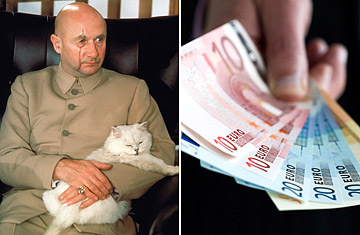
If you believe some European politicians, there may be a sinister force behind the economic crises currently convulsing Greece and Spain and threatening the stability of the euro. They believe the problems in the two countries did not happen by accident or even as a result of poor financial planning, but were instead planned all along in order to destabilize the euro. One can almost picture a bald man with an evil laugh stroking a white cat in a hollowed-out volcano and plotting world domination.
Last month, Greek Prime Minister George Papandreou blamed his country's economic meltdown on "an attack on the euro zone by certain other interests, political or financial. We are being targeted, particularly with an ulterior motive or agenda." And according to Spain's El Pais newspaper, agents at the country's National Intelligence Center are investigating whether "attacks by investors and the hostility shown by some sectors of the British and U.S. press" amount to "collusion." "None of what is happening, including editorials in some foreign media with their apocalyptic commentaries, is happening by chance or innocently," Spanish Transport Minister José Blanco declared in a radio interview earlier this month.
Nor is there just one alleged plot involved. The colorful Greek Deputy Prime Minister Theodoros Pangalos this week claimed that the Nazi theft of Greek gold during World War II was to blame for the country's ballooning deficit, which has shaken investors' confidence in the euro, causing it to plunge in value against the dollar in recent weeks.
Gold theft aside, is there any truth to the other conspiracy theories being circulated? "This certainly has some entertainment value," says Johnny Munkhammar, a research director at the European Enterprise Institute, a Brussels-based think tank aimed at promoting entrepreneurship. "But the idea that any of these theories have anything to do with creating the current crisis is, of course, ridiculous." He says Greece is to blame for its own mess, having amassed a huge pile of debt from years of statistical fraud in Greece's public-accounts sector. "Politicians turn to conspiracy theories because they feel they need someone else to blame," Munkhammar says.
The blame is certainly going around. Many conspiracists accuse "foreign hands," more specifically Anglo-Saxons, for the Greek and Spanish crises, arguing that they have always hated the euro and are now using their hedge funds and media operations to bring it down. Some suggest that speculators are attacking the euro to block moves toward tougher European Union regulation of the market. Others, like European Central Bank chief economist Jürgen Stark, suggest people are perpetrating a ruse to hide the U.K.'s budget deficit. "It's astonishing to see where most of the criticism of the euro is coming from," Stark says. "Much of what they are printing reads as if they were trying to deflect attention away from problems in their own backyards."
Nicolas Véron, a senior fellow at the Breugel economic think tank in Brussels, says the theories reflect a virulent public mistrust of the free market in euro-zone countries, particularly in southern Europe. "There is a very long and deep suspicion of markets in these places," he says. But he adds that these countries are guilty of shifting the blame for their own problems. "It is absurd to imply a political purpose in this," Véron says. "This scapegoating is a distraction from the serious political reform that is needed and contributes to ingraining political prejudices."
But while most conspiracy theories are overblown, some experts believe there is at least some kernel of truth to them. "They are correct to say there has been massive short-selling against the euro," says Iain Begg, an associate fellow at the London think tank Chatham House. "Speculation is what markets are about. It is simply an opportunity to make money. Financial markets are amoral, feral beasts. If they see a weakness, they go for it. And Greece was seen as weak." He admits that the role of Goldman Sachs and other major banks in helping Greece disguise its mounting debts — which U.S. Federal Reserve Chairman Ben Bernanke pledged on Thursday, Feb. 25, to investigate — reinforces the image of evil geniuses pulling the market's strings. But Begg stresses that conspiracy theories were being bandied about long before the Goldman Sachs revelations emerged and were characterized by deliberately vague allegations about political and media interests.
Begg sees a deeper purpose behind the blame game, as politicians try to mitigate the public criticism that will accompany the inevitable austerity measures needed to fix the Greek and Spanish economies. "There is an Italian concept of vincolo esterno, or external constraint," he says. "It is a device a canny politician can use to say, 'We must do this or we will be eaten alive.' Although the conspiracy theories are preposterous, they help prepare for the reforms which are needed."
So perhaps there is a devious conspiracy behind these countries' financial problems after all. If so, it's one concocted by the very politicians conjuring up the conspiracy theories.
